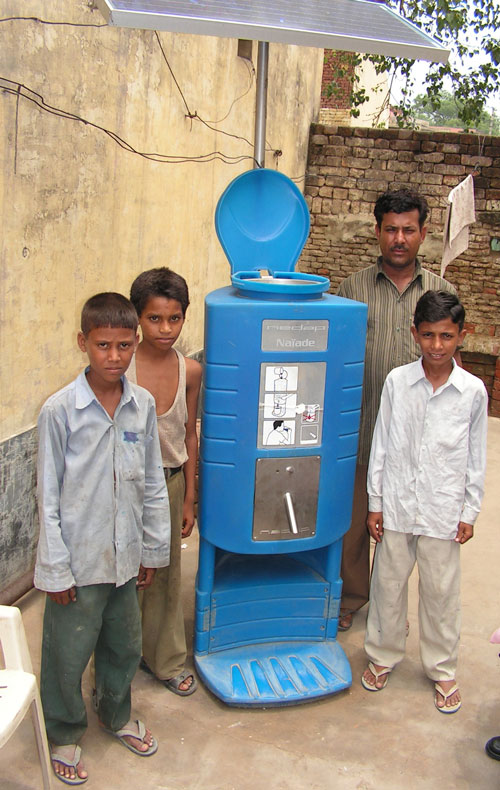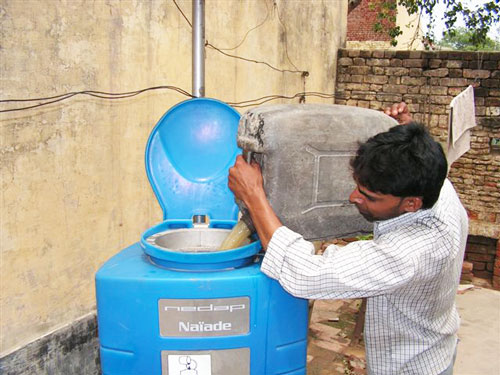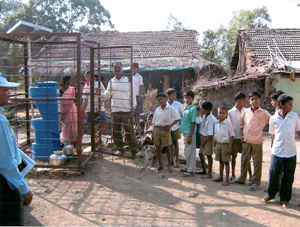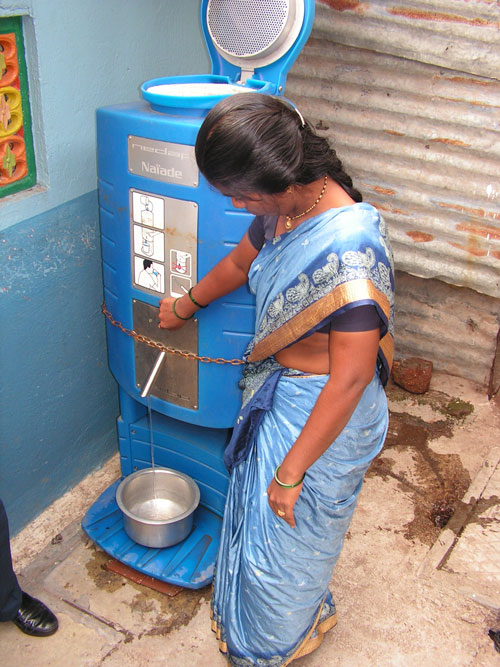Difference between revisions of "Naiade water purification unit"
(New page: ==Disclaimer== On this page, commercial water treatment systems are collected. The information on this page has been provided by the companies who produce the products, and has not been ch...) |
(→Manuals, videos and links) |
||
| (48 intermediate revisions by 4 users not shown) | |||
| Line 1: | Line 1: | ||
| − | + | [[Image:naiade1.jpg|thumb|right|200px| The Naiade water purification unit used in India. Note the PV panel above the unit.]] | |
| − | + | __NOTOC__ <small-title /> | |
| + | The Naiade water disinfection unit is a spin-off from Nedap’s and Trojan’s know-how of large scale drinking water and industrial waste water treatment plants. The Naiade drinking water disinfection unit very effectively combines the potential offered by solar energy, UV light and battery back-up. | ||
| − | + | The Naiade has been designed to remove bacteria, protozoa, viruses and colloidal parts from raw sweet water. It operates without the use of fossil fuel or chemicals. | |
| + | |||
| + | The unit is made of tropical resistant poly ethylene. Its dimensions are 150 x 50 x 50 cm. | ||
| + | The purification of the Naiade are: | ||
| + | |||
| + | # a sieve to remove larger parts such as leaves, stones etc. | ||
| + | # a 25 micron filter bag | ||
| + | # a 10 micron filter bag | ||
| + | # a UV light, which kills any remaining bacteria and viruses | ||
| + | |||
| + | ===Suitable conditions === | ||
| + | The unit has been designed for operation under harsh conditions in grass root societies. Units can be installed, operated and maintained by people with no or little/low technical education or background. | ||
| + | |||
| + | |||
| + | {| border="1" cellpadding="5" cellspacing="0" align="none" | ||
| + | |- | ||
| + | ! width="50%" style="background:#efefef;" | Advantages | ||
| + | ! style="background:#f0f8ff;" | Disadvantages | ||
| + | |- | ||
| + | | valign="top" | - Immediate use after installation <br> | ||
| + | - Supply for great number of people <br> | ||
| + | - High yield <br> | ||
| + | - State-of-the-art UV technology <br> | ||
| + | - Robust technology <br> | ||
| + | - Use of re-usable materials<br> | ||
| + | - Independent of fossil fuel or electrical network <br> | ||
| + | - Alternative to liquid chlorine disinfection <br> | ||
| + | - Environmentally friendly <br> | ||
| + | - The use of a native speaking sales and distribution network <br> | ||
| + | | valign="top" | - Dependent to solar energy, although battery system is standard <br> | ||
| + | - Imported product; with possibility of local production based on annual turnover <br> | ||
| + | |} | ||
{{Potential_Treatment_Capacity_table | {{Potential_Treatment_Capacity_table | ||
| Line 16: | Line 48: | ||
- Taste <br> | - Taste <br> | ||
- Odor <br> | - Odor <br> | ||
| − | - Color | + | - Color<br> |
| not= | | not= | ||
| − | - Dissolved Chemicals (such as pesticides, fertilizers, arsenic etc.)* | + | - Dissolved Chemicals (such as pesticides, fertilizers, arsenic etc.)* <br> |
| − | | process=Filtration + UV light | + | | process=Filtration + UV light treatment |
| − | | watcrit= | + | | watcrit=Fresh water, not contaminated with dissolved chemicals. |
}} | }} | ||
| − | * | + | |
| + | ===Operations and maintenance=== | ||
| + | [[Image:naiade3.jpg|thumb|right|200px| Adding source water]] | ||
| + | [[Image:naiade4.jpg|thumb|right|200px| Protected unit in a cage]] | ||
| + | [[Image:naiade2.jpg|thumb|right|200px| The Naiade water purification unit.]] | ||
| + | |||
| + | The Naiade can be installed in 30 minutes by local people without a | ||
| + | technical background. A step-by step, pictured instruction leaflet and tools are provided. | ||
| + | |||
| + | The user has to fill the unit with raw sweet water. This can be done via the top lid. The water passes a coarse sieve, two filter bags, 25 and 10 micron resp., and a cylindrical tube with a UV lamp. The unit has its own reservoir for raw water of 100 liters. The unit is so easy to use that even small children can operate it. | ||
| + | |||
| + | After having filled the unit with raw water, one just pushes the button. Clean and disinfected water flows out from the tap. The normal flow rate is 5 – 6 liters per minute. No waiting time is required. Water flow can be stopped/interrupted by pressing the button again. After 2 minutes, the tap closes automatically to avoid spillage of water. The flow rate is not influenced by the user, it is restricted by the design to guarantee a proper UV treatment of all passing water. | ||
| + | |||
| + | The capacity is about 3,500 liters per day, depending on the scale of organization. | ||
| + | |||
| + | The disinfected water fulfills the World Health Organization standards. Pathogen reduction rates up to 99,99% are obtained in many applications. (More details are available on request). It is strongly recommended to use separate containers for the raw and disinfected water to avoid recontamination. | ||
| + | |||
| + | The unit can function at night using a car battery of not less than | ||
| + | 36 amp/hr capacity. | ||
| + | |||
| + | A supervision structure to guarantee optimal use is highly recommended. | ||
| + | |||
| + | ====Treatment Efficiency==== | ||
| + | {{Treatment_Efficiency | ||
| + | |lab:bacteria=Up to 100% | ||
| + | |lab:viruses=>99.9% | ||
| + | |lab:protozoa=>99.9% | ||
| + | |lab:helminths=Up to 100% | ||
| + | |lab:turbidity=Not available | ||
| + | |lab:iron=- | ||
| + | |field:bacteria=Up to 100% | ||
| + | |field:viruses=Not available | ||
| + | |field:protozoa=Not available | ||
| + | |field:helminths=Up to 100% | ||
| + | |field:turbidity=Strong reduction, only optically indicated | ||
| + | |field:iron=- | ||
| + | |extra_field=- | ||
| + | |lab:extra= | ||
| + | |field:extra= | ||
| + | }} | ||
| + | Based on UV light treatment experience using similar lamp systems, inserted in other Naiade units with different flow speeds, it can be safely assumed that there are no differences between the results obtained in the field and laboratories. | ||
| + | |||
| + | ====Maintenance==== | ||
| + | Both filter bags can be removed from the unit for cleaning purposes. After careful flushing these bags can be replaced. The life span of the UV lamp is 10,000 operating hours, nearly 3 years. The UV lamp can be replaced within half an hour by the users themselves. | ||
| + | |||
| + | The cleaning procedure should be as follows: | ||
| + | * Daily cleaning the PV panel for optimal energy supply | ||
| + | * Regular rinsing or washing of the filter bags to avoid blockage by sediments or a micro biological layer | ||
| + | * Regular cleaning of the glass tube of the UV lamp to avoid sedimentation. This highly depends on the chemical consistency/content of the raw water. | ||
| + | |||
| + | A colored LED indicates the status. After 8,000 hours of use the unit starts giving warning for necessary replacement of the UV lamp, although the users still have 2,000 hours of use to exchange the UV lamp. After 10,000 hours the unit will not supply any water until the old UV lamp has been replaced.Replacement of the UV lamp can be done on the spot by just undoing four screws. | ||
| + | The UV lamp is a standard industrial UV lamp. | ||
| + | |||
| + | ====Manufacturing==== | ||
| + | The unit does not contain any moving parts except for the electro-magnetic tap. | ||
| + | |||
| + | It is made of tropical resistant poly ethylene. All material as well as the applied technology is based on the intensive use in remote and tropical areas. | ||
| + | |||
| + | The device was laboratory test from Unesco-IHE, Institute for Water Education. | ||
| + | Field tests were done by the Water Research Institute of the Council for Scientific and Industrial Research, Ghana and ATIRA-Ahmedabad, India. | ||
| + | Amongst others, received two prestigious international awards on sustainable development. | ||
| + | |||
| + | ====Estimated Lifespan==== | ||
| + | The estimated lifespan of the unit is over 10 years. Filter bags and UV lamps may need earlier replacement. | ||
| + | |||
| + | The UV lamp has a life of 10.000hrs or 3 years at 9 h/day continuous service. The filter needs to be replaced approximately every 12 months depending on TSS of influent/washing frequency. The back up battery (12V-50Ah) lasts 36 hours. Built-in electronics will register the used time of lamp and a light in front of the unit will indicate when the lamp needs to be replaced. | ||
| + | |||
| + | ===Field experiences=== | ||
| + | Naiade projects have been realized in: | ||
| + | |||
| + | Afghanistan, India, Sri Lanka, Pakistan, Indonesia, China, Brazil, Surinam, Mexico, Colombia, Morocco, Senegal, Sudan, Mozambique, Madagascar, Burkina Faso, Ghana, Tanzania, Cameroon, Benin, Mali, Egypt, South Africa, Kenya, Nigeria. | ||
| + | |||
| + | ===Manuals, videos and links=== | ||
| + | *[http://www.nedap-naiade.com www.nedap-naiade.com] | ||
| + | *[http://www.naiadenorthamerica.com www.naiadenorthamerica.com] | ||
| + | *[https://www.youtube.com/watch?v=9SxbNsPcsnA Youtube Movie Naiade in India] | ||
| + | |||
| + | ===Company Information=== | ||
| + | Company: Nedap NV <br> | ||
| + | Visitor address:<br> | ||
| + | Parallelweg 2<br> | ||
| + | 7140 DC Groenlo<br> | ||
| + | The Netherlands<br> | ||
| + | |||
| + | Postal address:<br> | ||
| + | P.O. Box 101<br> | ||
| + | 7140 AC Groenlo<br> | ||
| + | Phone: +31 (0)544 471 888<br> | ||
| + | Fax: +31 (0)544 486 008<br> | ||
| + | Email: info@nedap-naiade.com<br> | ||
| + | |||
| + | |||
| + | Naïade North America <br> | ||
| + | Phone: +1 888.780.7873 <br> | ||
| + | Email: [email protected] <br> | ||
| + | |||
| + | ===Acknowledgements=== | ||
| + | *KIWA Evaluation report. Declaration of the performance of the Naiade, Nieuwegein, The Netherlands, January 2005 | ||
| + | *IFFCO Declaration of performance, New Delhi, India, April 2008 | ||
| + | *Ghana Standards Boards, Accra, Ghana, December 2005 | ||
| + | *UNESCO-IHE, Naiade Performance Testing, Delft, The Netherlands, December 2004 | ||
| + | *Test reports on the Naiade, Water Research Institute, Accra, Ghana, September 2005 | ||
| + | *Naiade water disinfection efficiency test report, Ministry of Water and Livestock Development, Dar es Salaam, Tanzania, November 2004 | ||
| + | *Performance Evaluation Repot, Ahmedabad Textile Industry’s Research Institute, Ahmedabad, India, August 2005 | ||
| + | *Naiade Test Results, Marmara University, Istanbul, Turkey, September 2004 | ||
| + | *Analyse d’eau, Ministre de l’energie, des mines et de l’eau, Bamako, Mali, Octobre 2008 | ||
| + | *Test results Naiade, Chinese Centre for Disease Control, Beijing, China, May 2007 | ||
| + | *Test results of the Naiade, Governement de Bamako, Bamako, Mali, April 2008 | ||
| + | *Test results RAND Water South Africa, August 2013 | ||
| + | *Test results SEPTA Mexico January 2015 | ||
Latest revision as of 09:41, 6 August 2015
The Naiade water disinfection unit is a spin-off from Nedap’s and Trojan’s know-how of large scale drinking water and industrial waste water treatment plants. The Naiade drinking water disinfection unit very effectively combines the potential offered by solar energy, UV light and battery back-up.
The Naiade has been designed to remove bacteria, protozoa, viruses and colloidal parts from raw sweet water. It operates without the use of fossil fuel or chemicals.
The unit is made of tropical resistant poly ethylene. Its dimensions are 150 x 50 x 50 cm. The purification of the Naiade are:
- a sieve to remove larger parts such as leaves, stones etc.
- a 25 micron filter bag
- a 10 micron filter bag
- a UV light, which kills any remaining bacteria and viruses
Suitable conditions
The unit has been designed for operation under harsh conditions in grass root societies. Units can be installed, operated and maintained by people with no or little/low technical education or background.
| Advantages | Disadvantages |
|---|---|
| - Immediate use after installation - Supply for great number of people |
- Dependent to solar energy, although battery system is standard - Imported product; with possibility of local production based on annual turnover |
|
|
Operations and maintenance
The Naiade can be installed in 30 minutes by local people without a technical background. A step-by step, pictured instruction leaflet and tools are provided.
The user has to fill the unit with raw sweet water. This can be done via the top lid. The water passes a coarse sieve, two filter bags, 25 and 10 micron resp., and a cylindrical tube with a UV lamp. The unit has its own reservoir for raw water of 100 liters. The unit is so easy to use that even small children can operate it.
After having filled the unit with raw water, one just pushes the button. Clean and disinfected water flows out from the tap. The normal flow rate is 5 – 6 liters per minute. No waiting time is required. Water flow can be stopped/interrupted by pressing the button again. After 2 minutes, the tap closes automatically to avoid spillage of water. The flow rate is not influenced by the user, it is restricted by the design to guarantee a proper UV treatment of all passing water.
The capacity is about 3,500 liters per day, depending on the scale of organization.
The disinfected water fulfills the World Health Organization standards. Pathogen reduction rates up to 99,99% are obtained in many applications. (More details are available on request). It is strongly recommended to use separate containers for the raw and disinfected water to avoid recontamination.
The unit can function at night using a car battery of not less than 36 amp/hr capacity.
A supervision structure to guarantee optimal use is highly recommended.
Treatment Efficiency
| Bacteria | Viruses | Protozoa | Helminths | Turbidity | Iron | {{{extra_Field}}} | |
|---|---|---|---|---|---|---|---|
| Laboratory | Up to 100% | >99.9% | >99.9% | Up to 100% | Not available | - | |
| Field | Up to 100% | Not available | Not available | Up to 100% | Strong reduction, only optically indicated | - |
Based on UV light treatment experience using similar lamp systems, inserted in other Naiade units with different flow speeds, it can be safely assumed that there are no differences between the results obtained in the field and laboratories.
Maintenance
Both filter bags can be removed from the unit for cleaning purposes. After careful flushing these bags can be replaced. The life span of the UV lamp is 10,000 operating hours, nearly 3 years. The UV lamp can be replaced within half an hour by the users themselves.
The cleaning procedure should be as follows:
- Daily cleaning the PV panel for optimal energy supply
- Regular rinsing or washing of the filter bags to avoid blockage by sediments or a micro biological layer
- Regular cleaning of the glass tube of the UV lamp to avoid sedimentation. This highly depends on the chemical consistency/content of the raw water.
A colored LED indicates the status. After 8,000 hours of use the unit starts giving warning for necessary replacement of the UV lamp, although the users still have 2,000 hours of use to exchange the UV lamp. After 10,000 hours the unit will not supply any water until the old UV lamp has been replaced.Replacement of the UV lamp can be done on the spot by just undoing four screws. The UV lamp is a standard industrial UV lamp.
Manufacturing
The unit does not contain any moving parts except for the electro-magnetic tap.
It is made of tropical resistant poly ethylene. All material as well as the applied technology is based on the intensive use in remote and tropical areas.
The device was laboratory test from Unesco-IHE, Institute for Water Education. Field tests were done by the Water Research Institute of the Council for Scientific and Industrial Research, Ghana and ATIRA-Ahmedabad, India. Amongst others, received two prestigious international awards on sustainable development.
Estimated Lifespan
The estimated lifespan of the unit is over 10 years. Filter bags and UV lamps may need earlier replacement.
The UV lamp has a life of 10.000hrs or 3 years at 9 h/day continuous service. The filter needs to be replaced approximately every 12 months depending on TSS of influent/washing frequency. The back up battery (12V-50Ah) lasts 36 hours. Built-in electronics will register the used time of lamp and a light in front of the unit will indicate when the lamp needs to be replaced.
Field experiences
Naiade projects have been realized in:
Afghanistan, India, Sri Lanka, Pakistan, Indonesia, China, Brazil, Surinam, Mexico, Colombia, Morocco, Senegal, Sudan, Mozambique, Madagascar, Burkina Faso, Ghana, Tanzania, Cameroon, Benin, Mali, Egypt, South Africa, Kenya, Nigeria.
Manuals, videos and links
Company Information
Company: Nedap NV
Visitor address:
Parallelweg 2
7140 DC Groenlo
The Netherlands
Postal address:
P.O. Box 101
7140 AC Groenlo
Phone: +31 (0)544 471 888
Fax: +31 (0)544 486 008
Email: [email protected]
Naïade North America
Phone: +1 888.780.7873
Email: [email protected]
Acknowledgements
- KIWA Evaluation report. Declaration of the performance of the Naiade, Nieuwegein, The Netherlands, January 2005
- IFFCO Declaration of performance, New Delhi, India, April 2008
- Ghana Standards Boards, Accra, Ghana, December 2005
- UNESCO-IHE, Naiade Performance Testing, Delft, The Netherlands, December 2004
- Test reports on the Naiade, Water Research Institute, Accra, Ghana, September 2005
- Naiade water disinfection efficiency test report, Ministry of Water and Livestock Development, Dar es Salaam, Tanzania, November 2004
- Performance Evaluation Repot, Ahmedabad Textile Industry’s Research Institute, Ahmedabad, India, August 2005
- Naiade Test Results, Marmara University, Istanbul, Turkey, September 2004
- Analyse d’eau, Ministre de l’energie, des mines et de l’eau, Bamako, Mali, Octobre 2008
- Test results Naiade, Chinese Centre for Disease Control, Beijing, China, May 2007
- Test results of the Naiade, Governement de Bamako, Bamako, Mali, April 2008
- Test results RAND Water South Africa, August 2013
- Test results SEPTA Mexico January 2015




